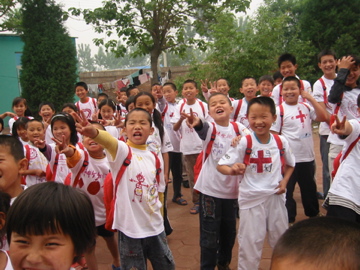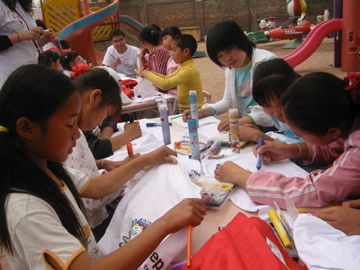Profiles
T-shirts bring on children's smiles
By Bernice Chan (chinadaily.com.cn)
Updated: 2007-06-02 16:34
 |
Large Medium Small |
"Ni hao! Hello!" exclaims 11 year-old Zhou Yiyi when she sees a group of strangers arrive by taxi. She's dressed in a pink T-shirt and pants with her hair in pigtails. She takes an adult by the hand and leads them to the schoolyard where older children are wiping down small tables and chairs.
A group of volunteers has come to Guang Ai Migrant School Hou Shayu, in the outskirts of Beijing to celebrate T-Shirt Day. This is the second year it's held to coincide with International Children's Day. It's an event organized by Magic Hospital in Beijing to bring a bit of cheer to kids who are in difficult circumstances.
Teacher Shi gives instructions to over 50 children to stand in line according to their age groups and they quickly scurry into place. They range in age from 4 to 17 years, and they live and study in this small compound.
 Students from Guang Ai Migrant School put on the T-shirts they decorated with colored markers in the Shunyi District of the outskirts of Beijing June 2,2007. [chinadaily.com.cn]  |
Upstairs are the dormitories, where rows of small shoes are lined outside each door. And inside the rooms, there are four metal bunk beds pushed together, but in fact 10 children sleep there, with two smaller students sharing one bed. Underneath the beds are plastic washbasins, one for each child.
The school was started four years ago and Li explains these students are the sons and daughters of migrant workers, children "left behind" as their parents travel far to find a job. "We give the pupils a basic education so that by the time they reach 17 or 18 years of age, they will be able to find a basic job," he explains.
But back outside in the schoolyard, the children wait patiently as volunteers sort out their presents to give to the children. They each bow in appreciation of their gift. It's a bright red backpack and inside is a set of pencil crayons, paper, colored markers, a plain white T-shirt, two milk boxes and hand wipes.
Then they sat down at the tables and volunteers encouraged them to draw on the T-shirts. Some children were hesitant and preferred to practice their designs on paper first, while others eagerly grabbed the felt-tip markers and wasted no time in drawing on the cotton shirt.
Many drew hearts, others butterflies and flowers. One drew a multi-colored rainbow complete with flowers and a house. The volunteers, mainly Spanish expatriates and some native Beijingers went around the tables and praised the children on their artistic talents.
And when they were done, the students put on their new clothes over their scruffy ones and laughed and pointed at each other's work.
This year's T-Shirt Day was held in 12 locations in Beijing, including Guang Ai Migrant School, Beida Hospital, Street Children Protection Center, and Wisdom Springs. Some children are in hospital for various diseases or psychological problems, disadvantaged youth, or those whose parents were either executed or imprisoned.
T-Shirt Day has also expanded to Shanghai and Tianjin this year with hopes of expanding the project of bringing more smiles to children's faces in others cities across the country.
